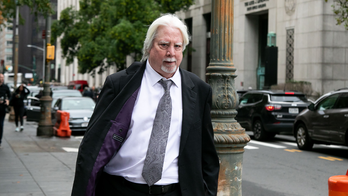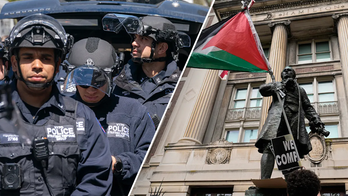
Don't try to swipe a book from the Library of Congress -- library investigators might soon be getting their guns back.
Investigators with the Library's Office of the Inspector General have raised a string of objections after Congress stripped them of their ability to buy and carry firearms.
Though the office has carried firearms in the course of its duties for the past 15 years, and inspector general agents at other federal agencies do the same, lawmakers inserted language into the fiscal year 2009 omnibus spending bill, which was signed into law in March, that prohibited the library's officers from using federal funds to "purchase, maintain or carry" firearms.
They cited an apparent "separation of powers" concern -- the library's investigators are deputized by the U.S. Marshals, which falls under the executive branch, but they investigate abuses in the Library of Congress, which falls under the legislative branch.
Inspector General Karl Schornagel cried foul.
"It's never been questioned until just recently," he told FOXNews.com. "Consider that we've been doing this for 15 years, we're very successful."
The office wrote in its semiannual report to Congress in March that the decision would "impede" investigations. It also received an opinion in April from the Government Accountability Office that there is no legitimate "separation of powers" concern.
Schornagel said the IG's agents just want to be "made whole again."
Crimes against the Library of Congress take many forms. The IG's office investigated child pornography, embezzlement, identity theft and credit card fraud in the last fiscal year, according to its own accounting. It executed 13 search warrants and served 19 subpoenas, while winning one guilty plea and conviction.
While investigating crimes in and against the Library of Congress might not sound like the most dangerous job, another official in the inspector general's office said most of their investigations take them off site, into some dangerous neighborhoods in the District of Columbia, Maryland, Virginia and other states.
Though no agent with the Library's IG office has ever fired a gun in the course of duty, Schornagel said much of his agents' work "requires a firearm." He said there's always the chance a suspect could get violent -- plus the guns can be a deterrent to violence during searches and arrests.
"It's a big safety issue," he said.
The agents, while not historically trigger-happy, nevertheless brandish their guns on raids.
"We unholster our weapons whenever we enter a property," the other official said. "It's mostly for defense purposes -- most of these people are felons anyway."
Rep. Debbie Wasserman Schultz, D-Fla., chairwoman of a House appropriations subcommittee, originally inserted the firearms language into the omnibus -- but aide Jonathan Beeton told FOXNews.com that she only did so at the request of another member on the panel, and that no such requests have been made this year for the fiscal 2010 appropriations bill.
Calling the debate "moot," he wrote in an e-mail that the fiscal year 2010 budget should allow the IG agents to again carry firearms, as early as the beginning of the fiscal year on Oct. 1.
It won't come soon enough for Schornagel, and won't necessarily satisfy all his grievances. His office wants the ability restored immediately as well as some kind of legislative assurance that this won't happen again.
Aside from the concern about his agents' safety on the job, he said the lack of firearms has "crippled" investigations.
Not having firearms means the agents can't execute searches or arrests, he said -- and that means they have to seek outside help when it comes time to get a warrant. That's problematic for a couple of reasons, Schornagel said. First, outside agencies like the FBI are a little too busy to help in Library of Congress investigations; second, outside officers would have to take time to retrace the steps of the original investigative team because they have to swear to the credibility of evidence when they seek a warrant.
He said one identity theft case has been put on hold for these reasons.
"This person has committed a crime against the Library of Congress and he is not being arrested," Schornagel said.
"We are the only ones who can conduct, really, effective investigations at the Library of Congress," he said.
The IG office's latest semiannual report detailed one other peculiar investigation in which an individual allegedly swiped two 1920s reference books from a Library reading room.
The other IG official, who wished not to be identified, said the objection over the firearms could be connected with ongoing friction between the Librarian of Congress, James Billington, and the IG's office.
Billington's office recently chided the IG's office for the tone of its investigations. The official said that objections over the agents' use of firearms also originated in Billington's office. "We connected the dots," the source said.
Sen. Charles Grassley, R-Iowa, addressed the friction between the two offices in a letter last week to Billington, in which he said he is "increasingly alarmed" by apparent attempts to "obstruct" the IG's office. He cited an instance in which the Library of Congress' chief operating officer complained to the inspector general's office about the tone of a press release announcing the 10-year prison sentence of a former Library employee for possession of child pornography.
Jo Ann Jenkins, in an August 2008 e-mail attached to Grassley's complaint, scolded the IG's office for what she called the "outrageous" press release headline.
"Why does the IG feel it necessary to get publicity on this," she wrote, according to the e-mail.
She apparently didn't realize the press release came out of the Department of Justice, not the IG's office -- which the IG's office pointed out to her.
In his letter, Grassley urged Billington to "refrain from interfering either directly or indirectly" with the inspector general's operation.
Though Grassley did not address the firearms controversy, a Grassley aide suggested the senator does support Schornagel on that issue.
A representative for Billington could not be reached for comment. But he also came under pressure recently from the Federal Law Enforcement Officers Association to change his position on the firearms issue.
Jon Adler, president of the association, urged Billington to reconsider in an April 29 letter.
In the letter Adler wrote that his organization was "deeply concerned" by the "disarming" of the Library's IG agents. He said their duties are not "interchangeable" with other law enforcement agencies and that the situation would lead to a "less secure environment" at the Library of Congress.




